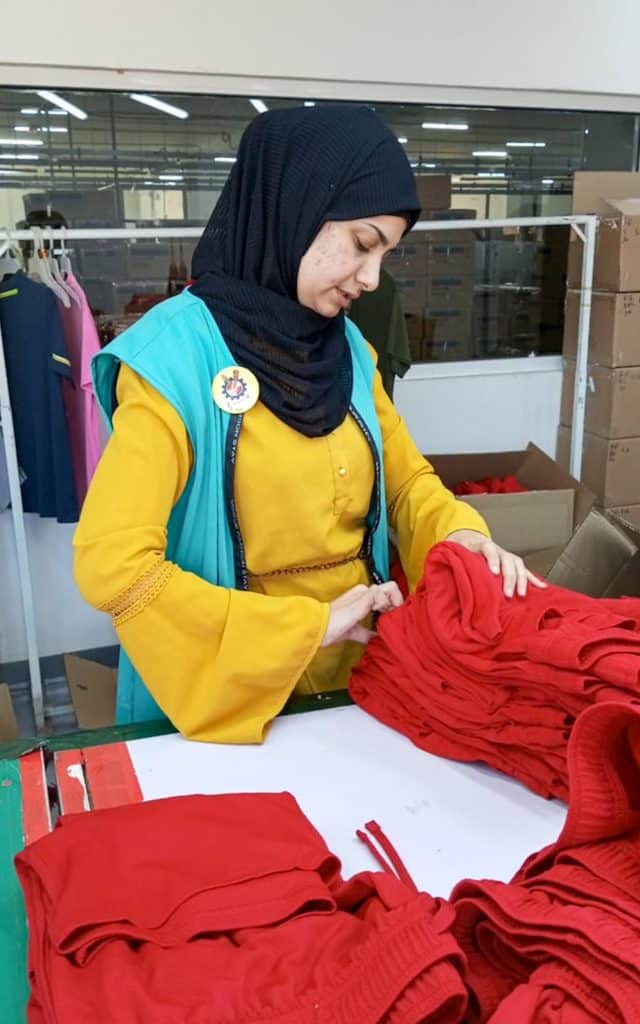AMMAN, Jordan, 3 December 2023 – On this year’s International Day of Persons with Disabilities, Better Work Jordan wants to share and celebrate the story of Sajida Al-Musedein, 26, a Jordanian embroidery artisan with physical disability and vision impairment who, thanks to her resilience and determination, found a job in one of the country’s garment factories and eventually became a union committee member. Today, she represents the voices of her colleagues, giving special attention to workers with disabilities, across the industry.
Jordan’s garment industry employs around 70,000 workers, including from East and Southeast Asia as well as local Jordanians. Among those, over a thousand are workers with disabilities, of whom over 60 percent are women. Disabilities include visual and hearing impairment, motor and mobility disabilities, intellectual, and developmental disabilities.
The Jordanian Labour Law and the 2017 Law on the Rights of Persons with Disabilities stipulate that any business with 50 or more employees, as is the case for most garment factories, must ensure that people with disabilities make up a minimum of 4% of the total workforce.
While the garment sector is a good example across Jordan’s industries in providing employment for women and men with disabilities, more could be done to facilitate their employment and boost their representation.
For example, factories could do work to make their facilities disability friendly. This could include paving factory floors, using easy-to-read signs and equipment or adding simple ramps to enhance mobility, orientation, workplace safety, and accessibility.
Also, developing and implementing vocational programmes to promote the employment of women and men with disabilities in the garment sector is a key step. Workers with disabilities are often assigned simple jobs regardless of their competencies and abilities. Training programs would help potential workers acquire and develop both soft and technical skills that would enhance their employability. This, in turn, would provide garment factories with more qualified staff, resulting in a win-win situation for all.
Addressing social stigma and prejudices is also another crucial step for promoting inclusive employment practices for people with disabilities, both in the garment sector and across the entire labor market. Supporting ongoing initiatives that raise awareness and discredit stereotypes associated with disabilities is vital.
But the garment sector, as well as the labour market in Jordan, should further work on the limited access to information and lack of awareness of labour rights for women and men with disabilities.
Workers with disabilities, particularly women, are largely unaware of factory level union committees and the sector trade union. Lack of inclusion in decision-making bodies and administrative positions hinder their ability to influence meaningful changes in their work environments.
In an important development for the Jordanian garment industry, the General Trade Union of Workers in Textile, Garment, and Clothing Industries in Jordan launched a five-year strategy to reinforce the organisational capacity of the union in 2021. Better Work Jordan contributed to shaping up the strategy, which focuses on improving communication and engagement with garment workers, including those with special needs or gender-related needs.
Elected union committees of female and male workers of different nationalities in every garment factory have, since then, started holding routine meetings with the union and ensuring these objectives are met.
Today, about 450 workers belong to this union labor committee, three of whom are workers with disabilities. Although this number is still too small, it is, nonetheless, a first positive step to scale up inclusivity across the sector. Sajida is proudly one of them, representing her fellow workers in advancing their rights and interests as partners in dialogue with employers.
Her story offers a great example and inspiration for her colleagues, paving the way for other women and men with disabilities to follow in her footsteps, running for such representative positions and eventually making the whole garment sector a more inclusive, just, and represented industry.
Read Sajida’s story and join us in celebrating and highlighting her achievements!
In her voice: Sajida’s story
I was born an ordinary girl in Jordan’s city of Tafilah, but destiny had different plans. A significant temperature spike affected my left foot, eyes, and speech. Unfazed, my parents sought help, consulting doctors, and closely monitoring my health. Over time, I recovered my speech, underwent an artificial tendon implant in my foot, and received extensive treatment for my eyes.
Growing up in a loving family, I felt their steadfast support at every step. Schooling lasted until the eighth grade, but health issues forced me to alternate, monthly, between school and the hospital. Despite being targeted by bullies because of my health, I always knew I would overcome my challenges.


Determination became my ally. Even confined at home, I delved into embroidery, refining my skills. With my family’s support, I opened an embroidery workshop, selling my handmade crafts locally.
News of a garment factory opening in Tafilah reached me through my sister, an employee there. Discovering the factory employed workers with disabilities inspired me. I applied and, surprisingly, was accepted without conditions.
The first workday brought fear, joy, and uncertainty about societal acceptance. Despite challenges and pitying glances, I persevered, surpassing expectations.
Recognizing my health, I shifted from production to packaging. Grateful for the opportunity, I anticipate navigating any role without disability constraints.
Ambitions soared with news of union committee elections in September 2022. Compelled to run, I became a bold advocate for workers with special needs, transcending fear.
As a union committee member, my duties extend beyond personal goals. Advocating for workers, especially those with disabilities, I envision a future where the factory exemplifies inclusivity.
The factory has the potential to be a model of inclusion. My role isn’t just work; it’s a force for positive change, fostering a conversation to enhance conditions for everyone.
Work profoundly impacted my life, granting me independence and responsibility. Now I contribute to my family and have, transformed from feeling like a burden to being an active contributor.
In the future, I see myself as a beacon of empowerment for those facing adversity. I dream of inspiring others. I want the echo of my success to reverberate in the hearts of those who are told that their dreams are limited.